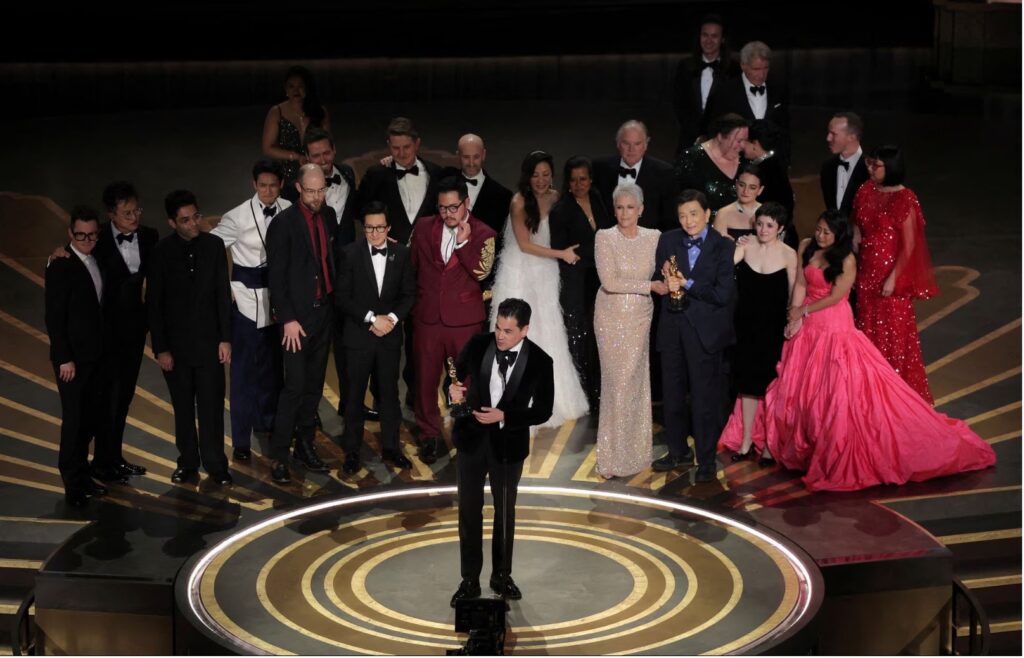
Riley Sardinha
Editor-in-Chief
The 95th Oscars Awards ceremony came and went on March 12 with much to talk about in a more positive light. The Academy and its attendees have learned their lessons from last year, both in stage banter and giving viewers what they want out of the show. The new silver carpet signaled a change in the Oscars before it even started.
After years of backlash, all 23 categories were brought back to broadcast, giving justice to the behind-the-scenes workers who deserve the spotlight just as much as the actors and directors. This meant speeches had to be shorter during the four hour run (including commercials), which sadly led to some of these winning groups getting cut off far too early.
Kimmel’s overall performance hosting the Oscars went smoother than other years, commenting on the nominated films while still allowing time for jokes surrounding Elizabeth Banks’s “Cocaine Bear” or the extremely odd events of last year. Even the bit on asking Nobel Prize winner Malala Yousefi about pointless celebrity drama was forgotten just as it was happening.
The musical interludes, including the “In Memoriam” segment fronted by Lenny Kravitz, were tastefully and tactfully done in this year’s Oscars. “This is a Life”, however, seemed to be an off-night for Talking Heads’s David Byrne. Yet, “RRR”’s viral “Naatu Naatu” made up for it by winning Best Original Song; the first award of its kind for one from an Indian film.
Rihanna and Lady Gaga put on powerhouse displays on opposite ends of people’s expectations, with Rihanna wearing a black rhinestone dress surrounded by a Wakanda-inspired scene on stage. Meanwhile, Lady Gaga opted for a seated, stripped-down performance of “Hold My Hand” from “Top Gun: Maverick” wearing a T-shirt, sweatpants and no makeup; a complete 180 from her previous stage outfits. The flow between awards announcements and musical bits felt natural and exciting.
Each of the independent non-Best Picture film nominees felt well-made in their own rights, each with a fair backing of audience members. Guillermo Del Toro’s “Pinocchio” won Best Animated Feature, the first non-Disney film in four years to do so.
Other films nominated for Best Picture included a number of sequels that had a significant fanbase, instead winning in other big categories like “Avatar: The Way of Water” for Best Visual Effects, “Black Panther: Wakanda Forever” for Best Costuming and “Top Gun: Maverick” for Best Sound Design.
“All Quiet on the Western Front” received a lot of love as well, being an adaptation of Erich Maria Remarque’s 1929 historical fiction novel on the horrors of World War I. Directed by Edward Berger, the film won the awards for Cinematography, Production Design, Score and Best International Film.
Perhaps the most heartwarming moment of the night was for Brendan Fraser winning Best Actor for “The Whale.” This happened to be his first mainstream comeback to the film industry after he was cast out for speaking against an executive who sexually assaulted him in 2003. The support of others working in media and film fans agreed that both the Oscar and Fraser’s return were not just deserved, but long overdue.
There will always be some upset for Best Picture, and the same goes for “Everything Everywhere All at Once.” The movie took home six additional Oscars, even though many online audiences thought its means of telling its story were ‘aimless’ or even ‘pretentious.’ Yet, at the core of this surreal fantasy-action film about dimensional travel was instead a poignant story about an immigrant mother wanting to rekindle her relationships with her estranged husband and adult daughter.
Many viewers felt this was a deserved win for directors Daniel Kwan and Daniel Scheinert, along with the film’s leads Michelle Yeoh and Ke Huy Quan for Best Actress and Best Supporting Actor, respectively.
Quan’s story actually mirrors that of Fraser’s, where Quan instead felt pigeonholed into stereotypical roles of Asian side characters to the point where he felt undesirable and stopped acting. It wasn’t until “Crazy Rich Asians” came out in 2018 that Quan felt inspired to return to the industry, which interestingly also starred Michelle Yeoh.

As many of the night’s wins went to deserved people and productions, fans of other films like “The Banshees of Inisherin,” “Triangle of Sadness” and “Tár” that didn’t win anything can still retain that passion.
Much of what initially might turn viewers off from watching the Oscars were improved upon this year. Behind-the-scenes workers got some better recognition, films from independent or smaller creators were favored over ones from household names, and the loving interpersonal relations between the nominees felt more genuine.
The show had many pitfalls over the years, and still has a ways to go in improvement, but it seems like the audiences’ influences over them now are louder than ever.
In the end, viewers should know that awards and broadcasted ceremonies don’t make films’ legacies. People do.
Check out https://www.oscars.org/oscars/ceremonies/2023 to learn more on the nominated films.

